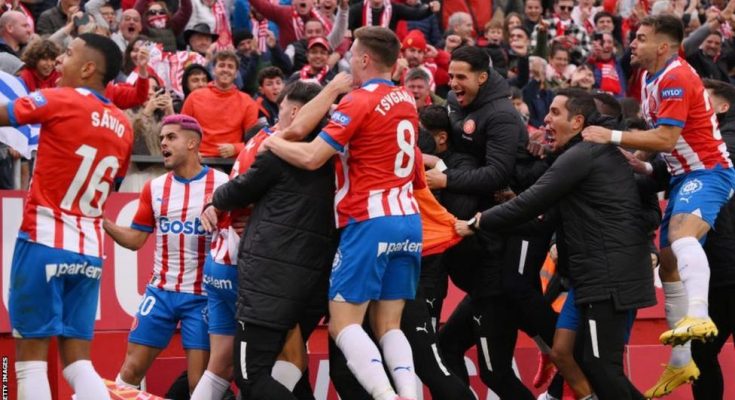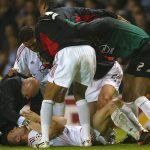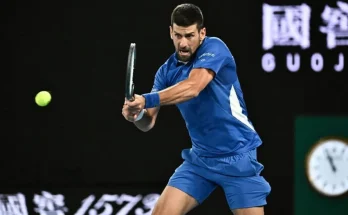The fiercely proud and patriotic land that is Catalonia is no stranger to flying its flag through its achievements in football.
But this season it is not the exploits of Barcelona that have been dazzling the footballing world but rather the achievements of the region’s second city, Girona, and especially those of their head coach, Miguel Angel Sanchez Munoz known as Michel.
Girona currently sit joint top of the table with Real Madrid on 48 points after a first half of the season that has seen them score more goals than anyone else (46) and suffer just one defeat, a 3-0 loss at home to Carlo Ancelotti’s side in September last year.
To win La Liga – talk currently banned by the club itself – would class as one of football’s greatest stories and dwarf Leicester City’s Premier League title win of 2016.
But how has a club, with an attendance of just 200 at the turn of the century, even got themselves in contention?
From 200 fans to Europe’s elite
Established 93 years ago Girona didn’t even make it into the second tier of football until 2008.
Historically, most of the city’s footballing fans from the city have supported Barcelona or even Espanyol. Despite playing in the smallest stadium currently in La Liga’s top flight, back as recently as 1999 the 15,000 capacity Estadi Montilivi must have looked cavernous with about 200 fans dotted around it watching their side play in the fifth tier of Spanish football.
But things started to change when the side finally went up to Spain’s second tier back in 2008 following back-to-back promotions. They made it into the top flight for the first time in their then-87-year history after finishing second in the table at the end of the 2016-17 season.
The arrival at the club at the end of the 2014-15 season of Guardiola, not Pep, but his younger brother Pere, revolutionised things at the club.
Pere came to the club with a background in football marketing and development with companies like Nike. Back in 2009 he had co-founded his own agency and gone on to become one of the most influential agents in football with a list of clients including his brother, Andres Iniesta and Luis Suarez.
Despite relegation a couple of seasons later, Girona returned to the top flight in 2022, winning the play-off 3-1 against Tenerife, after two seasons of play-off heartbreak.
Their return was masterminded by coach Michel who had joined the club at the start of the 2021-22 promotion-winning campaign. A change of fortune for the manager that had received his marching orders from his two previous clubs – Rayo Vallecano and Huesca – both of whom he had previously led into the first division only to be sacked when things started to go wrong.
One of the keys to Michel’s first season at the club was the owners keeping faith in him when the team found itself at the wrong end of the table. They ended up promoted and then finishing 10th in their first campaign back, despite the loss of key players.
An eventual Xavi successor at Barcelona?
Michel has a bit of Pep Guardiola about him although he is a long way from being a footballing innovator or visionary.
While he is certainly intense, the 48-year-old has got a clear idea of what he wants and how to achieve it on the pitch, and has the ability to improve players and change his team’s tactics mid-game. Michel’s basic approach is based on possession when required, but also directness and counter-attacking – a mix not too dissimilar to that of Manchester City.
He also knows how to direct his players, which is something that few managers are able to do successfully and he has a keen eye for the smaller details.
Even though he has regular contact with Pep Guardiola, he appreciates where he is now and where he has come from.
Previous experiences have shown that when you are the ‘minnows’ swimming around the La Liga shark tank, it is frequently ephemeral and only achieved as a result of all the hard work that is done on a day-to-day basis.
So while others are making comparisons with Leicester City’s monumental title-winning achievement, for now Michel is taking nothing for granted other than perhaps the satisfaction of knowing that the 48 points his side has amassed to date will guarantee top-flight safety. And, yes, perhaps the possibility of reaching Europe is one that has been discussed in the changing rooms.
His parents ran a fruit shop in the working class Vallecas district of Madrid and because they had to work up to 12 hours a day to put food on the table, Michel and his three brothers were brought up by their grandparents.
Vallecas was his home and he would go on to become a hero at Rayo Vallecano, where he made 425 appearances over two spells at the club before becoming their coach in 2017. It taught him to integrate because the area was heavily populated with many immigrants and people of all origins.
And wherever he went, he did so with the words of his grandmother in his ears. “Adapt where you go,” she told him.
Michel’s attention to detail, and how to adapt, has not gone unnoticed either.
One of the first things he did when he arrived in Girona was start taking lessons in Catalan.
Michel first started to speak it shortly after he arrived in Girona without his family. He was befriended by an elderly couple in the flat next door who introduced him not only to the Catalan language, but to some of the region’s culinary delights.
The fans adore him for it and are frequently heard chanting, “Michel..Catala!!”. They refer to him as ‘Un dels nostres’ (‘one of our own’) and recently presented him with a flag picturing him wearing the classic ‘barretina’, the woollen hat that is symbolic of Catalonia.
Not surprisingly, his achievements have earned him the envious gaze of bigger clubs around Europe’s big leagues, with Bayern Munich and Newcastle rumoured to be sniffing around.
But the stories doing the rounds that he is on the verge of leaving Girona and finding a bigger home for his talents are way off the mark. For the time being he is going nowhere, although in the future I see him as a perfect fit for the manager’s seat at Catalonia’s big brother, Barcelona, once Xavi’s tenure is over.
Girona chairman Pere Guardiola is realistic about his coach’s future.
He said recently: “He can leave whenever he wants, he’s earned it. If a team comes in and he’s excited about it, thank you and goodbye.
“If he received an offer from Bayern and had a contract with Girona, I would take him by car to Munich myself! What he has done in Girona is something to be eternally grateful for.”
How important is Girona’s link with the Man City group?
On 23 August 2017, City Football Group (CFG), a subsidiary of Abu Dhabi United Group, purchased 44.3% ownership in Girona. Another 44.3% was held by Girona Football Group, led by Pere Guardiola.
Soon after arriving at the club, Pere Guardiola set about securing loan deals for fringe City players or talented youngsters in need of minutes to develop into world-class stars – something that has been a major source of Girona stars down the years.
In 2015/16, four players were loaned from Man City to Girona, three In 16/17, and five in 17/18. The next season it was three, in 2020/21 it was four, then three last season – including one from another CFG-owned club New York City.
A union of several clubs around the world, with Manchester City clearly the standout, it allows for a simpler exchange of footballers between teams.
It is however far from being the major reason for the club’s success, which is due mainly to some extremely shrewd dealing on the transfer and loans market despite severe financial limitations.
Published figures illustrate the huge gap between La Liga’s giants and clubs like Girona in all aspects of the club including salaries for everyone including players and coaches.
Real Madrid’s expenditure limit this season is 727.5m euros (£626m), Atletico Madrid 296.4m euros (£255m), Barcelona 270m euros (£232m). Girona’s is just 52m euros (£44.7m), the eighth-lowest in the league. Links to the City Football Group means the much-used “punching above their weight” phrase is never applied to this Girona organisation, although it most certainly should be.
Key to the plan has been sporting director Quique Carcel, whose acumen in the market has helped Michel build the foundations that have brought success.
His ability to spot talent and build teams for each manager has really stood out, as well as his skill in constantly rebuilding every season to cover for departures.
There have been signings as well as numerous loan deals, although nothing like the big-money buys of Europe’s elite clubs.
Artem Dovbyk, Girona’s record signing at 7.5m euros from Dnipro this summer, caught sporting director Carcel’s eye after scoring 24 goals in 30 games last season while his Ukrainian international team-mate in Tsygankov came in from Dynamo Kyiv.
Perhaps the best example of the club’s canny scouting ability is seen in the form of 19-year-old loanee winger Savio, one of the highlights in La Liga this season and someone who never even featured for Troyes after they signed him from Atletico Mineiro for around 7m euros (£6m) in 2022.
Over and above everything the Girona story is all about sound housekeeping and level-headedness. They have spent just 4.35m euros (£3.74m) more than they earned in sales – 10 teams in La Liga had a bigger net spend.
With that they have managed to put together a squad made up of veterans and youngsters, loanees and rejects. In total, Girona have spent just 33.75m euros (£29m) in transfer fees on the entire squad. Only five other teams in La Liga have spent less and Real Madrid’s squad cost 573m euros (£493m).
Could Girona shock the footballing world and repeat Leicester City feat?
While Leicester’s title achievement was huge, a similar triumph for Girona would surpass it.
While everyone is enjoying their runaway success, the chances of maintaining it until the end of the season are remote and any talk of winning the title is banned at the club.
What it has shown, however, is that in a world of football financial lunacy exhibited primarily by their illustrious countrymen 100km due south, is that it is not all about money and stars, and footballing success and sound management and careful housekeeping are not mutually exclusive.
And while no-one is talking about lifting the title, it’s worth noting that in the history of La Liga, no club with this number of points at this stage of the season has ever failed to qualify for the Champions League.
Now that really would be a success story.








